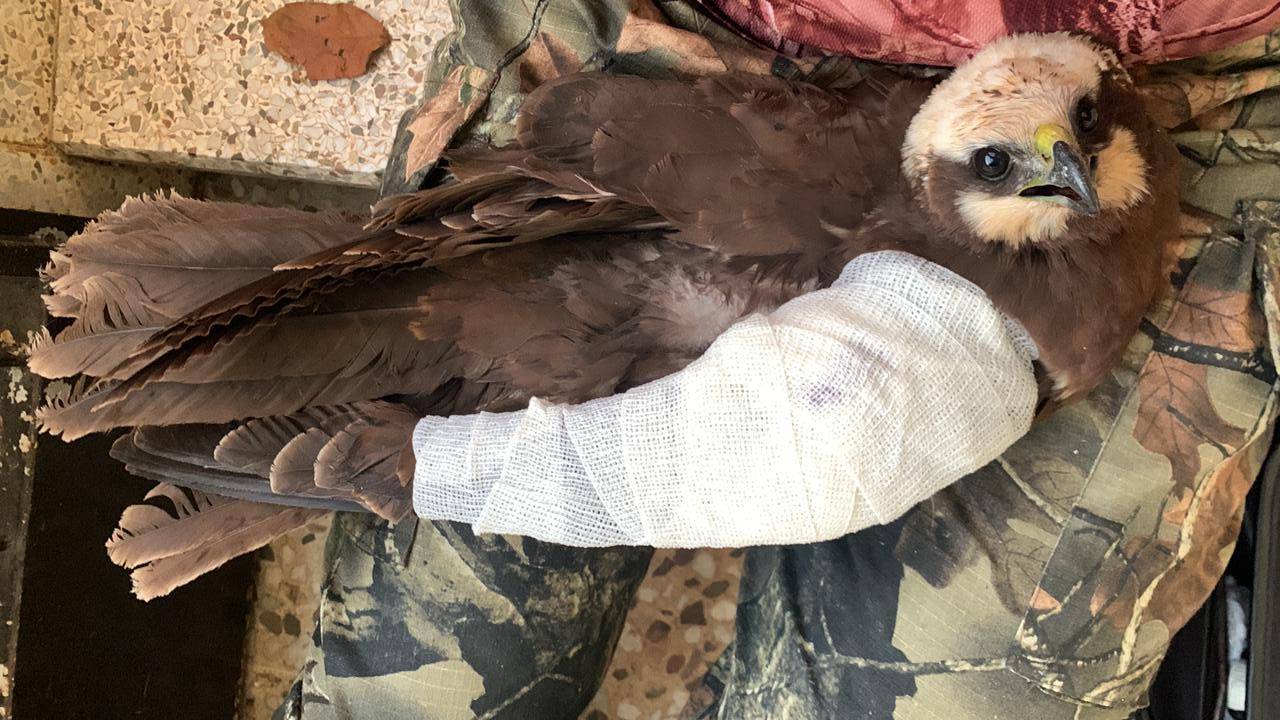An injured stork, rescued by the Lebanese association for migratory birds. (Credit: Michel Sawan)
Every year, the passage of migratory storks over Lebanon is met with carnage, the perpetrators of which seem to take pride in the bloodshed, proudly posting videos of it on social media.
This year was no exception. In a video taken in Akkar, North Lebanon, and posted on Instagram Thursday, men stood on a hill shooting, at point-blank range, a flock of storks in full flight. The bodies of the stricken birds fell to the ground where the men rushed to retrieve them.
Michel Sawan, director of the Lebanese Association for Migratory Birds, has noted many massacres of storks in recent days in North Lebanon, notably in Denniyeh. He claims that in this region, around forty birds have been killed and their corpses abandoned.
According to Sawan, his association treats around a hundred injured birds each migratory season, from March to April for the spring migration season and from September to October for autumn.
Sawan spoke with L’Orient-Le Jour to share his knowledge on the subject and his experience dealing with the deeply harmful and widespread hunting of migratory birds in Lebanon.
OLJ: What route do storks take over Lebanon? What dangers do they face here?
Sawan: In spring, storks migrate from Africa to Europe, crossing Lebanon over the coast [which leads them to fly over certain regions of North Lebanon] in search of a cooler climate. In autumn, they make the opposite journey, flying over the Bekaa.
But there's a real problem in Lebanon because some people shoot migratory birds without any logical explanation. They simply say they can't help it and deny they do it to let off steam. Shot storks are then thrown away, as they are not edible.
On the other hand, some hunters capture live storks to keep as pets or to sell. Some believe that storks are like chickens and that they will rid the garden of worms or snails. Others buy owls or pelicans and keep them at home. Lebanon is a hub for animal trafficking, with some animals arriving from Iran, Syria and Iraq, before being resold in the Gulf States.
OLJ: What measures have been put in place to combat this scourge?
Sawan: Our association goes out into the field with the police but the troops' resources are fairly limited. We've even had to repair a police vehicle ourselves to be able to carry out this work. There aren't enough police officers to accompany us, but we do have some support from state institutions.
When we spot a flock of birds, we follow them by car to try and protect them from hunters. Some have been arrested, only to be quickly released due to political pressure. Our action covers the regions of Terbol, Hilan, Bousit, Beit Aoukar and Kfar Habou, all in North Lebanon.
We also work closely with the Polish embassy [the stork is a much-loved bird in the Polish imagination] and the IFAW (International Fund for Animal Welfare).
OLJ: What impact do these massacres have on the stork population?
Sawan: Storks are monogamous and only lay eggs every four to five years. So when we kill one partner, we condemn the other to death too, which means we've killed a generation of birds. Many females are killed and many birds are wounded by hunters as they fly over Lebanon.
Our association receives and treats many of these birds, but most succumb to their injuries. We receive around a hundred birds every migratory season.
Needless to say, we have a very bad reputation abroad, and we send out a negative image of the country through this kind of action.
 A wounded Roseaux Busard (Circus Aeruginos), rescued by the Lebanese association for migratory birds. (Credit: Michel Sawan)
A wounded Roseaux Busard (Circus Aeruginos), rescued by the Lebanese association for migratory birds. (Credit: Michel Sawan)